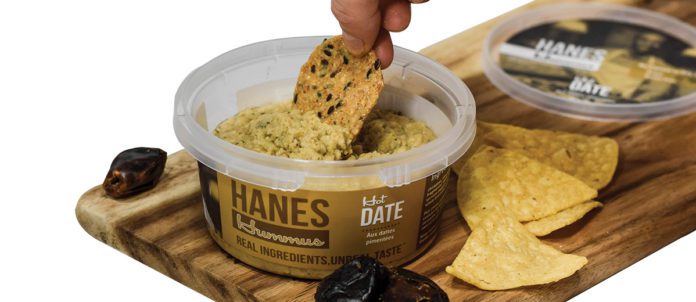Selling his homemade hummus was not on Yohannes Petros’ radar. The 46-year-old former sign-language interpreter and a yoga instructor started making the Middle-Eastern staple more than 20 years ago while living and going to school in Vancouver.
“I’m from a country called Eritrea, which is in East Africa,” says Petros. “My family immigrated to Canada and settled in Saskatoon in 1980. Oftentimes, people will assume that this is a family recipe or my mother’s recipe that’s been handed down and it’s not — we don’t eat hummus in Eritrea. The recipes I developed came from a lifetime of lived experiences both in Canada and in East Africa.”
The creator/owner of Hanes Hummus had no background in culinary or business. What he did have was a belief that he could build a better hummus.
“The recipes I’ve created appeal to those that like hummus and those that don’t and I’m very proud of the recipes and the style of hummus that I’ve created,” he says, pointing to his product’s thicker texture and homemade feel.
Petros started selling hummus out of his Saskatoon home in 2011 and a few years after that, began approaching some local stores.
In 2014, he exhibited at the Canadian Health Food Association, a national trade show held annually in Vancouver and Toronto.
“It was these events that showed me the possibility of reaching a larger audience, especially in the natural and health-food channels. I showed up not knowing anybody or anything about the business. It was really difficult for the first three or four years —nobody was giving me an opportunity.”
The message he kept hearing was ‘we already have hummus.’ “And my response was, ‘I know you have hummus, and lots of it, already, but the kind of hummus that I have is different’.”
Despite the pushback, Petros persisted. “I believed in the positive feedback I would consistently get from anybody that would buy it from me and say they wished they could buy it in stores. I knew I had something that genuinely connected with the end customer and that gave me the confidence to keep pushing.”
The biggest barrier to the product’s broader appeal was its short shelf life. Because it’s all natural, it originally had a two-week shelf life.
“I was not going to go down the path of what the big companies would do to get a longer shelf life,” he says. “I wasn’t willing to compromise, and I didn’t.”
Petros was able to find a recipe that would allow him to extend the product’s shelf life significantly, “and that’s made my life a lot easier as far as trying to get the attention of distributors.”
But, he says, there’s still there’s still a lot of challenges with the business, simply because the product is not mass produced like other brands of hummus out there.
“I begin with only whole ingredients,” he explains. “Part of the reason why my hummus has thicker texture is there’s no fillers of any kind. Oher hummus on the market is dominated by canola oil, or soy oil, and water — those are ingredients that allow the manufacturers to keep their costs down — and that’s something I’ve never done and will not do.”
About 85 per cent of the ingredients used in Hanes Hummus are sourced locally, such as Canadian-grown whole chickpeas (rather than chickpea flour used in most mass-produced hummus) and locally sourced garlic.
The oils found in most hummus offerings, which act as both fillers and preservatives, are not found in Hanes. His products also don’t undergo the heat-pasteurization process. “When I make my hummus, it immediately gets frozen and gets distributed frozen. There’s no other frozen hummus on the market.”
Once it’s unfrozen, Hanes Hummus has a two-month shelf life, though Petros jokes it never lasts anybody that long.
The product is currently available for foodservice and retail in three flavours: Moroccan Seven Spice (the company’s signature recipe), Roasted Garlic & Dill and Hot Date.
Hanes Hummus is currently manufactured in Saskatoon but Petros is in the process of moving his operations to Ottawa.
“Ontario is such a big market compared to compared to anywhere else in the country,” he says of the decision to relocate. “I’ve always wanted to get into the Ontario market, and I tried back in 2015 when I was just getting started, but I wasn’t ready at the time. Now I have the right partners in place and it makes sense to be there.”
By Amy Bostock


















